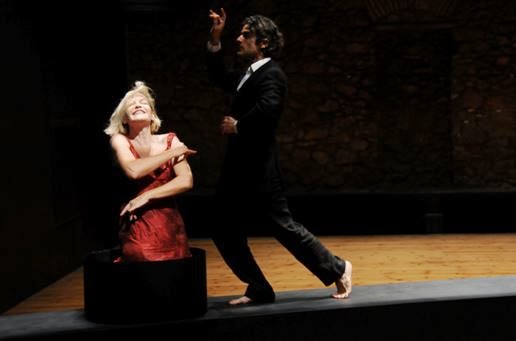
Amor @ Θέατρο Άττις | Attis Theatre
Απο τον Γιώργο Ευφραιμίδη
Σαν μια κραυγή απόγνωσης που σου τρυπάει απελπισμένα τα σωθικά, για τη ζωή που έχουμε συστηματοποιήσει στους ρυθμούς του κέρδους, το «Amor» που σκηνοθέτησε ο Θεόδωρος Τερζόπουλος είναι ένα έργο που γράφτηκε αύριο. Ο ορισμός του σύγχρονου θεάτρου ευδοκιμεί ιεροτελεστικά στην σκηνή του Άττις, σε μια παράσταση σαν εικαστική εγκατάσταση με τα χαρακτηριστικά ενός ηδονικού παραληρήματος. Οι στιγμές που το θέατρο γίνεται εμπειρία.
Ένας άνδρας με κοστούμι αλλά χωρίς παπούτσια και μια γυναίκα με ένα κατακόκκινο φόρεμα συναντιούνται στην σκηνή που αποτελεί τον ιδιότυπο χώρο δημοπρασίας. Το μέρος που όλα δειγματίζονται, ξεπουλιούνται και αγοράζονται. Εκείνος κοστολογεί με ακρίβεια ηλεκτρονικού υπολογιστή κέρδη, εισπράξεις και κεφάλαια. Εκείνη απεγνωσμένα διαθέτει συναισθήματα, υπάρχοντα ακόμη και τα ζωτικά της όργανα, όλα στο βωμό ενός μεταφυσικού χρηματιστηρίου αξιών. Εκεί, «στης Ευρώπης τον πάτο» όπως αναφέρει χαρακτηριστικά η Αγλαΐα Παππά, δηλώνοντας αμέσως το κοινωνικόπολιτικό στίγμα του έργου. Το οκτασέλιδο κείμενο αποτελεί σκηνική σύνθεση με αφορμή γραπτό του Θανάση Αλευρά. Στοιχεία επιθεωρησιακά που γαλούχησαν τον Τερζόπουλο, με τον Μπρέχτ και τον Μπέκετ να κοιτούν από ψηλά, το «Amor» εισβάλει επιθετικά και σε πενήντα πέντε λεπτά τα λέει όλα. Πως η εποχή, ο καπιταλισμός και οι συνθήκες των καιρών μετέτρεψαν τον άνθρωπο σε ένα ον παραδομένο στον παράφορο έρωτα του κέρδους. Παντελώς αποξενωμένο από το πραγματικό βίωμα της λέξης. Το στοίχημα άλλωστε που θέτει το έργο με το φινάλε του είναι σαφές. Οι αριθμοί μεγαλώνουν και μικραίνουν, οι καταθέσεις αυξάνονται και μειώνονται, οι κυβερνήσεις ανεβαίνουν και πέφτουν. Ο έρωτας όμως είναι πάντα εκεί. Πρωταγωνιστής αθέατος ή μη, έτοιμος με ένα εκκωφαντικό αλύχτισμα να επαναφέρει στην σωστή λειτουργία τους αισθητήρες μας. Σε αξίες και ιδανικά βαθιά ανθρώπινα. Ο Αντώνης Μυριαγκός έχει ντυθεί τον ρόλο του. Αψεγάδιαστος διευθύνει σαν μαέστρος πολυμελούς ορχήστρας τις ατάκες του σε μια από τις καλύτερες ερμηνείες της περιόδου. Η Αγλαΐα Παππά, προσφέρει αμέριστη σύμπραξη στον παρτενέρ της. Φλογερή όσο και η αύρα του φλαμένκο που χορεύει επί σκηνής. Το κείμενο πιθανώς να μην αντηχεί κάτι καινούργιο, διαφορετικό ή απροσδόκητα πρωτότυπο. Αναδεικνύει ωστόσο με την ουσία του αλλά και την σκηνοθετική συνεισφορά του Τερζόπουλου, το χαώδες κενό που χτίζουμε με το συναίσθημα που κινεί τα πάντα αλλά και το ρόλο του έρωτα ως κινητήριος δύναμη έμπνευσης, παραγωγικότητας και ελευθερίας.
By Kostas Prapoglou
Amor is the new production of Attis theatre in Athens starring Aglaia Pappa and Antonis Myriagkos, and directed by world acclaimed director Theodoros Terzopoulos, who also oversaw both the text composition (based on an initial text written by Thanassis Alevras) and scenic design.
Set in what appears to be an allegorical locus of some stock market or auction house, a suited male figure is in a constant intense dialogue with a semi naked female, unnoticeably emerging from the floor through a funnel. He discharges numbers and calculations, endlessly, unremittingly. Interrupted by words-commands ejected through her sardonic laughter (“buy”, “sell”, “credit me”), he recalculates and executes. Profit figures reshape, rise and inflate. His enigmatic hand signals reminiscent of the analogous gestures of stock market traders gradually become pathogenic; they reflect a state of discomfort, an unsettling experience of a cataclysmic and orgasmic crescendo. Numbers are mixed with words, his speech flow is interrupted by reflex repetitions, the unconscious is on the verge of revolt; “six, sex, success”.
She is now standing conceitedly before his eyes. Wearing a red gown she performs an -almost robotic- flamenco dance. Her footsteps, choreographed in three-quarter time, coil with forceful and vigorous laughter and more commands. Overshadowed by her greed he is constantly losing power. “I sell everything”, “my stomach”, “my kidney ”,“ non exit”, she firmly declares.
Roles progressively change, everything is for sale. Values diminish, profits deflate, debts grow. The former trader is trapped in his very own world. His hand gestures are deformed and now recall autistic and epileptic seizures. Previously constructed numbers and equations turn into deconstructed sounds, like a neurotic episode proverbial to situations of decay and decadence. Desperately seeking for an exit, he climbs away to escape when he spasmodically screams “AMOR” followed by a wolf’s scream.
In this minimalistic setting, where light and shadow balance on equal terms, Terzopoulos, tests the strengths and weaknesses of a capitalist system in the stock market of life. By evolving the two participating figures into an impersonal dialogue, he underlines the general consensus of a world crisis. Spoken in both Greek and English, the text encompasses an (auto)biography of today’s society and emphasises the social and political commentary of the praxis on a global scale.
The omnipresence of raucous humour is guardedly orchestrated to pronounce levels of sarcasm in very close proximity to the frail human hypostasis. Rigid facial expressions comingled with extreme body language and the staccato verbalisms of actress Aglaia Pappa succeed in ensnaring the audience. Concurrently, the continuous bombardment of myriads of numbers and words masterfully mass-produced through controlled breathing techniques by Antonis Myriagkos, establishes a disconcerting consciousness of self. Working in similar avant-garde fashion to Cabaret Voltaire, Terzopoulos has unquestionably achieved exhaustingly high performative utterance levels with his two actors.
“AMOR” (=love) is the only word thrown at us at the end, following the mayhem of that gruesome -almost sacrificial- trading ritual. Anything and everything can be sold and bought apart from love. And this is what is implied throughout the entire performance; her impassive flamenco dance and the mechanical movements of the male character lack of existent pathos. We witness the silent collapse and voidance of the two protagonists.
Conquered by the ephemera of the material world we are coerced to revert back from the start seeking primordial values and self-righteousness. The symbolism of love is concealed throughout the entire performance until it vulgarly hits the surface through the conduit of a cathartic scream.
For those who are fans of Terzopoulos’s work, Amor is a must see and a real treat. For those willing to get acquainted to his oeuvre, this is undoubtedly a great opportunity. It is a performance one would expect to see in major artistic events in the Greek capital such as the recently ended AGORA Biennale of Art, set at the site of the old Athens Stock Exchange. Such productions assist in elevating not just the quality and standards of artistic practice but may also become further accessible to wider and diverse audiences.

O Γιώργος Ευφραιμίδης μίλησε με τον πρωταγωνιστή της παράστασης Αντώνη Μυριαγκό:
Στην παράσταση ξεχωρίζει έντονα η κυριολεκτικά καταιγιστική σου ερμηνεία. Εκφέρεις αριθμούς, πράξεις και ορολογίες σε έναν ακατάπαυστο και ιλιγγιώδη ρυθμό. Πόσο δυσκολεύτηκες όταν πρωτοδιάβασες το κείμενο;
Κάποια στιγμή ύστερα από την διαδικασία επεξεργασίας του κειμένου έφτασε και στα χέρια μου ένα χαρτί. Το κείμενο που είχε γράψει ο Θανάσης Αλευράς περιείχε κάποιους χρηματιστηριακούς όρους και αριθμούς. Στην αρχή προσπάθησα να αποστηθίσω πέντε φράσεις, για να δω πως εκφέρονται. Αντιλήφθηκα ότι ήταν αδύνατον. Ήταν μια πολύ εγκεφαλική διαδικασία με ένα πολύ στεγνό αποτέλεσμα. Αρχίσαμε λοιπόν να επιμένουμε στους αυτοσχεδιασμούς, βρίσκοντας την σωματική λειτουργία που ενσωμάτωσε τους αριθμούς ώστε να μην «κλωτσάνε». Από εκεί και έπειτα οι αριθμοί για μένα ήταν φετιχοποιημένοι. Είχαν αποθεωθεί. Ήταν η θρησκεία μου.
Το έργο ενώ προβάλλει την αγάπη ως τη λύση του προβλήματος. Στο τέλος όμως ενώ ο άντρας και η γυναίκα που προσπαθούν καθ’ όλη τη διάρκεια της παράστασης να έρθουν κοντά, να νιώσουν ο ένας τον άλλον και να επικοινωνήσουν, απομακρύνονται. Δεν είναι αυτή τελικά η λύση;
Είναι πράγματι μια τεράστια αντίφαση στο έργο. Η αγάπη δίνεται ως απάντηση αλλά και ως ερώτηση. Amor; Υπάρχει; Μπορεί να μας σώσει ή είναι ένα άλλοθι; Η αγάπη σαφώς και μπορεί να μας σώσει αλλά το θέμα είναι να μπορείς να είσαι έτοιμος να αγαπήσεις και να αγαπηθείς. Ακόμη και αυτό προϋποθέτει αγώνα. Συνήθως λέμε με την αγάπη όλα λύνονται. Δεν είναι αυτονόητο και έτσι θέτουμε ένα ερώτημα.
Τα τελευταία οκτώ χρόνια συνεργάζεσαι με τον διεθνώς αναγνωρισμένο Θεόδωρο Τερζόπουλο, εμβληματική φιγούρα στο χώρο του θεάτρου. Υπάρχουν πράγματα που δεν ξέρουμε και δεν φανταζόμαστε για εκείνον;
Είναι ένας άνθρωπος με πάρα πολύ χιούμορ. Ενός υψηλού δείκτη αίσθησης χιούμορ. Φαίνεται και στην παράσταση άλλωστε. Επίσης είναι πολύ επίμονος και πολύ αυστηρός στην δουλειά του. Αυτό που με εντυπωσιάζει είναι η πίστη του σε αυτό που κάνει. Στην ιδέα που πρεσβεύει. Όχι απαραίτητα σε καθαρά επαγγελματικό πλαίσιο αλλά ως φιλοσοφία ζωής. Και αποτελεί μάθημα για την νεότερη γενιά.
Τα επόμενα σχέδια σου…;
Η παράσταση θα συνεχιστεί μέχρι την Κυριακή των Βαΐων και έπειτα από την νέα σεζόν. Όσο αφορά το καλοκαίρι, τις επόμενες ημέρες θα ξεκινήσω πρόβες για ένα έργο που θα παρουσιαστεί στο φετινό Φεστιβάλ Αθηνών. Πρόκειται για ένα κείμενο του Γιάννη Μαυριτσάκη, με πρωταγωνίστριες την Αμαλία Μουτούση και την Αλεξία Καλτσίκη σε σκηνοθεσία του Θάνου Παπακωνσταντίνου από την ομάδα The Helter Skelter Company.
Antonis Myriagos protagonist of the play talk to George Efremidis:
Your literally show stopping performance vividly stands out during the play. You utter numbers, operations and terminology at a relentless and breakneck pace. How much did you struggle when you first read the work?
After processing the work elaboration process, I received a piece of paper. It was the work written by Thanasis Alevras containing various stock market terms and numbers. At first, I tried to memorise five phrases to see how they are uttered. I realised it was impossible. It was a very cerebral process with a very dry result. So we began to insist on improvisation, locating the physical function that incorporated the numbers so they do not ‘jib’. From then on the numbers for me emerged as a fetish. They were glorified. They became my religion.
The work highlights love as the solution to the problem. But in the end while the man and woman trying throughout the duration of the play to become close, to feel one another and communicate, they are alienated. Is this not ultimately the solution?
It is indeed a huge contradiction in the work. Love is given as an answer and a question. Amor? Does it exist? Can it save us or is it an alibi? Love can definitely save us but the point is being able to get ready to love and be loved. Even that requires battle. We usually say that love solves everything. It is not self-evident and so we raise a question.
For the past eight years you have been collaborating with internationally acclaimed director Theodoros Terzopoulos, an iconic theatre figure. Are there things we don’t know and wouldn’t imagine about him?
He is a person with a great sense of humor. A high rate sense of humor. Besides, that is obvious in the play. He is also very persistent and strict in his craft. What impresses me is the belief in what he does. To the idea he stands for. Not necessarily in a strictly professional context but as a philosophy of life. And that is a lesson for the younger generation.
Your next plans…?
The play will conclude on 13 April and continue again in the new season. As for the summer, in the coming days I am starting rehearsals for a project presented at this year’s Athens & Epidaurus Festival. It is a work by Giannis Mavritsakis, starring Amalia Moutousi and Alexia Kaltsiki and directed by Thanos Papakonstantinou, of the Helter Skelter Company group.
